Feature: Remote Ugandan villages visualize better future with Chinese oil works in backyard
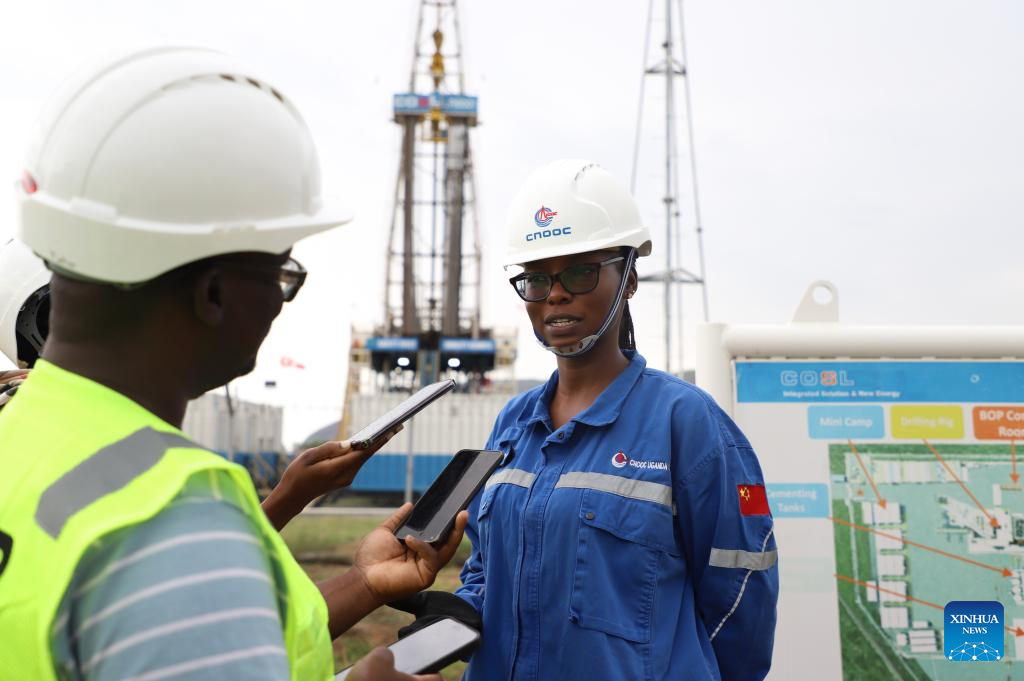
Vivian Naiga, a local worker at Kingfisher Oil Field run by China National Offshore Oil Corporation (CNOOC), is interviewed in Kikube, Uganda, on April 2, 2024. Local fishing and cattle grazing communities here in the remote western Ugandan villages are envisioning a future where nature, fossil fuels and humans are in harmony. (Photo by Patrick Onen/Xinhua)
KIKUBE, Uganda, April 12 (Xinhua) -- Local fishing and cattle grazing communities here in the remote western Ugandan villages are envisioning a future where nature, fossil fuels and humans are in harmony.
Recently 30 secondary school art students convened for a painting competition at an escarpment overlooking the Chinese-run Kingfisher Oil Field, fishing villages and Lake Albert, the freshwater body that is a source of livelihood for most of the locals.
The students, each visualized what the future would be, through their paint brushes showed a community whose livelihood has improved, the lush green escarpment preserved, and the dream of a country's industrialization realized. Chinese flowers and Uganda's national bird, the grey-crowned crane, were some of the elements in the drawings.
The competition, organized by the Chinese embassy here and China National Offshore Oil Corporation (CNOOC), the oil giant operating in Kingfisher Oil Field, was another move to engage local people in appreciating the oil sector and how best they stand to benefit from it.
"We grew up knowing that any country that has oil, has big money. So oil is mainly for industrial development. It supports every industrial sector let it be agriculture," said Rock Nowamani, one of the students competing under the theme, "The Beauties of Kingfisher Oil Field in Your Eyes."
Liu Xiangdong, president of CNOOC Uganda, while speaking at the event said the competition was geared towards fostering a deeper understanding and awareness of the Kingfisher project and its impact on strengthening the bond between Ugandan and Chinese peoples. He said the East African country can use the oil sector to transform and leap from agriculture to industrialization.
"The production and export of oil after its commencement will play a pivotal role in driving the country's overall gross domestic product (GDP). Additionally, it will better promote local economic development and improve people's livelihoods," Liu added.
CNOOC says it has so far invested 3 billion U.S. dollars in the last 10 years. The investment is China's largest single investment in Uganda in recent years. Experts say total investments in the country's oil sector are likely to top 15 billion dollars, attracting revenue of about 80 billion dollars, and creating thousands of jobs.
The initial investments in the sector are already changing the economic and social landscape in these villages and the country at large.
Villagers like Edisa Nakate who lives near the oilfield talked of how hard it used to be to access health care because patients had to be carried up the escarpment for a distance of about 10 km. But now, her village is connected to the rest of the country by a paved road, which is not only being used for accessing the oil wells but also benefits the communities nearby.
Liu said besides the environmental protection efforts, CNOOC continues to participate in education and talent development in the communities. Teachers' salaries in remote areas have been enhanced, and the best-performing students have been awarded cash prizes, while some even won scholarships to travel and study in China. Local youth have been employed through contractors.
Individuals directly affected by the oil works have been relocated to better places within the communities. For instance, Nakate was shifted to a permanent house after her previous house had to be removed to pave the way for a pipeline. Nakate is not alone, CNOOC has so far handed over 56 newly constructed resettlement houses to project-affected people.
China's involvement in Uganda's oil sector has also led to knowledge and skills transfer. Young people working in the sector talk about how they are gaining skills from Chinese experts. Vivian Naiga, 30, spoke fondly about her supervisors at CNOOC.
"Looking at the project, the complexity in drilling, for my training and learning and also for my career growth, I decided to join CNOOC. We are able to review drilling programs, ask questions directly from the drilling contractor, so that has been a good experience to have," Naiga said. "My Chinese mentor has over 10 years' experience in drilling oil and gas operations. The experience has been good."
Naiga said besides getting skills from international experts, mentorship programs, and training programs for national staff are regularly organized.
Uganda has so far discovered 6.5 billion barrels of oil in the western region, of which 1.4 billion barrels are commercially viable, according to Uganda's Ministry of Energy and Mineral Development.
Economic analysts and the Central Bank of Uganda predict that the oil sector will greatly fast-track the country's economic development, contributing to 30 percent of the country's GDP. ■
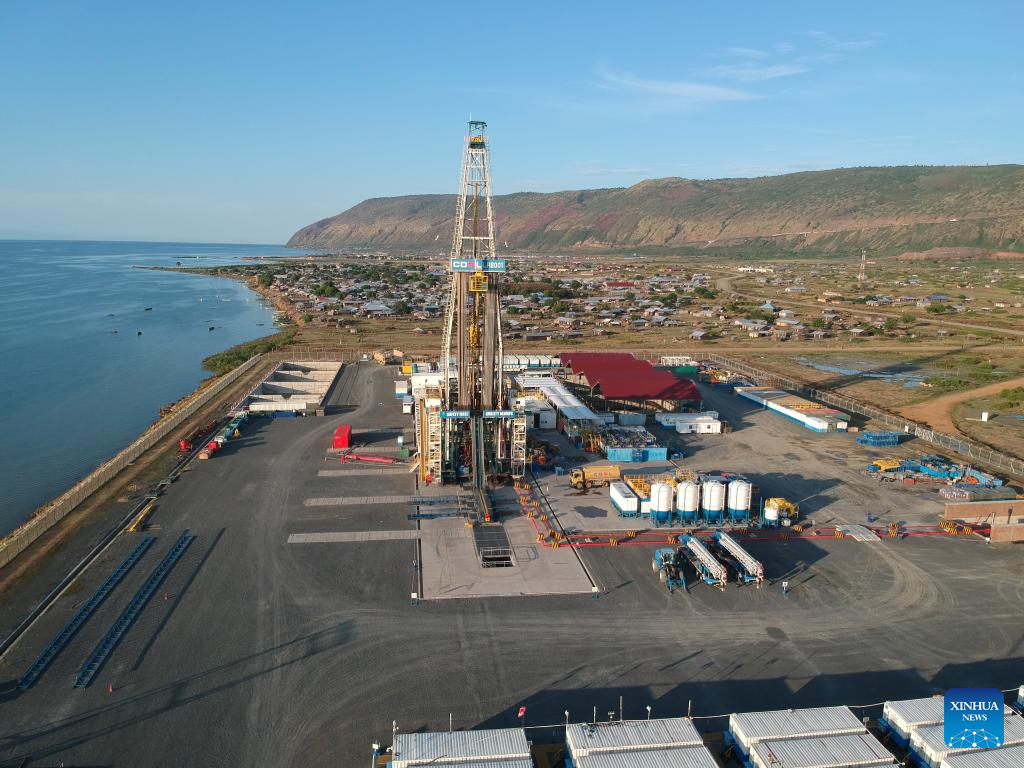
Aerial photo taken on April 1, 2024 shows Kingfisher Oil Field run by China National Offshore Oil Corporation (CNOOC) in Kikube, Uganda. Local fishing and cattle grazing communities here in the remote western Ugandan villages are envisioning a future where nature, fossil fuels and humans are in harmony. (Photo by Patrick Onen/Xinhua)
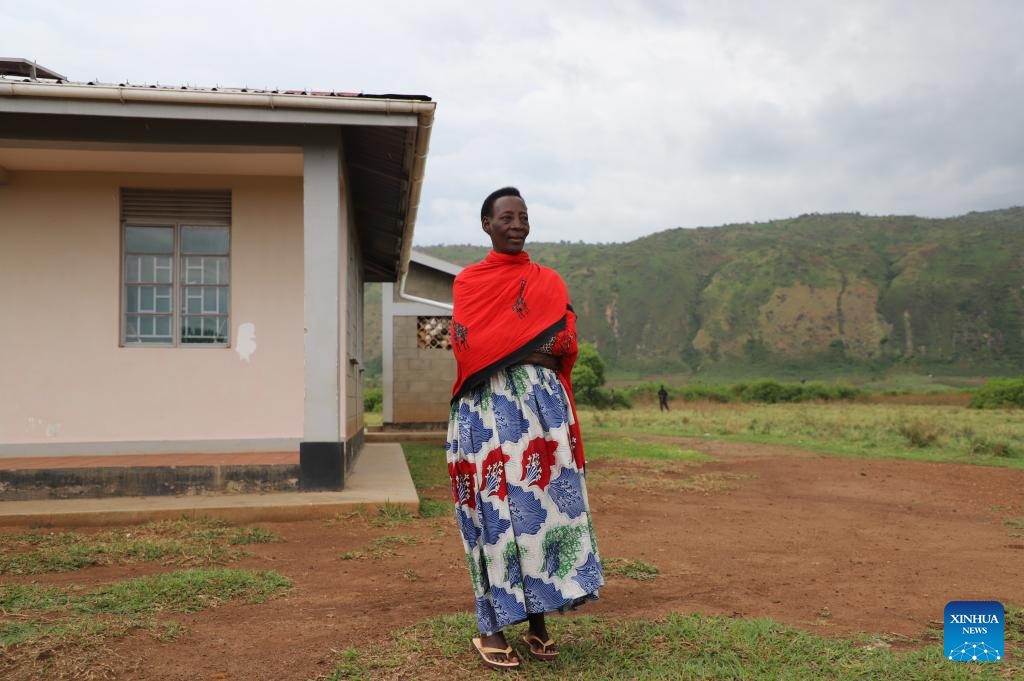
Edisa Nakate, a villager living near Kingfisher Oil Field run by China National Offshore Oil Corporation (CNOOC), stands in front of her new house in Kikube, Uganda, on April 2, 2024. Local fishing and cattle grazing communities here in the remote western Ugandan villages are envisioning a future where nature, fossil fuels and humans are in harmony. (Photo by Patrick Onen/Xinhua)
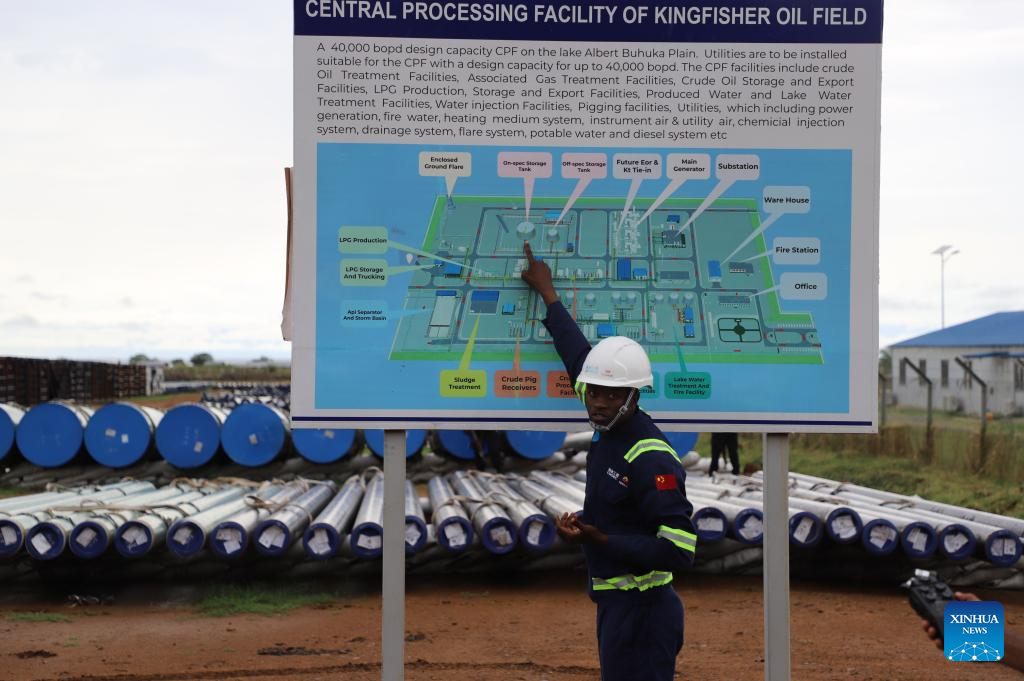
A worker shows the Central Processing Facility of Kingfisher Oil Field run by China National Offshore Oil Corporation (CNOOC) in Kikube, Uganda, on April 2, 2024. Local fishing and cattle grazing communities here in the remote western Ugandan villages are envisioning a future where nature, fossil fuels and humans are in harmony. (Photo by Patrick Onen/Xinhua)
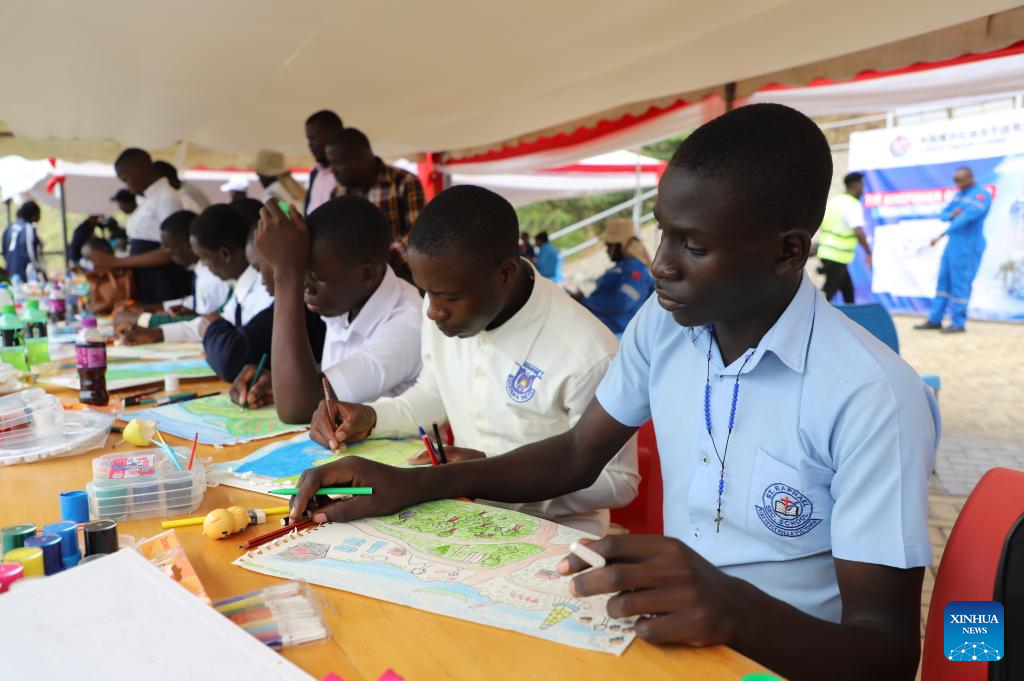
Students from nearby villages paint during "The Beauties of Kingfisher Oil Field in Your Eyes" competition in Kikube, Uganda, on April 2, 2024. Local fishing and cattle grazing communities here in the remote western Ugandan villages are envisioning a future where nature, fossil fuels and humans are in harmony. (Photo by Patrick Onen/Xinhua)
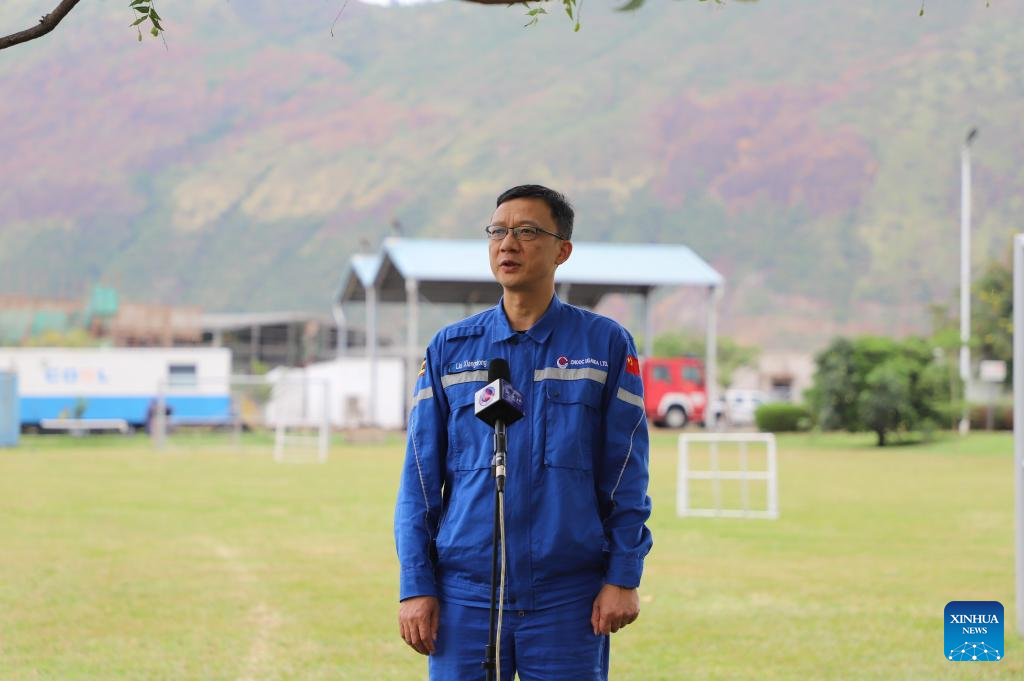
Liu Xiangdong, president of CNOOC Uganda, speaks during an interview at Kingfisher Oil Field run by China National Offshore Oil Corporation (CNOOC) in Kikube, Uganda, on April 2, 2024. Local fishing and cattle grazing communities here in the remote western Ugandan villages are envisioning a future where nature, fossil fuels and humans are in harmony. (Photo by Patrick Onen/Xinhua)
Related articles

China rejects US accusations over normal China
China firmly rejects U.S. groundless accusations over its normal trade and economic exchanges with R2024-04-30
North Carolina University system considers policy change that could cut diversity staff
RALEIGH, N.C. (AP) — The future of diversity, equity and inclusion staff jobs in North Carolina’s pu2024-04-30
Climate change will cost about $38 trillion a year by 2049, a new study calculates
Climate change will reduce future global income by about 19% in the next 25 years compared to a fict2024-04-30
Alabama lawmakers advance bills to ensure Joe Biden is on the state's ballot
MONTGOMERY, Ala. (AP) — Alabama lawmakers advanced legislation Wednesday to ensure President Joe Bid2024-04-30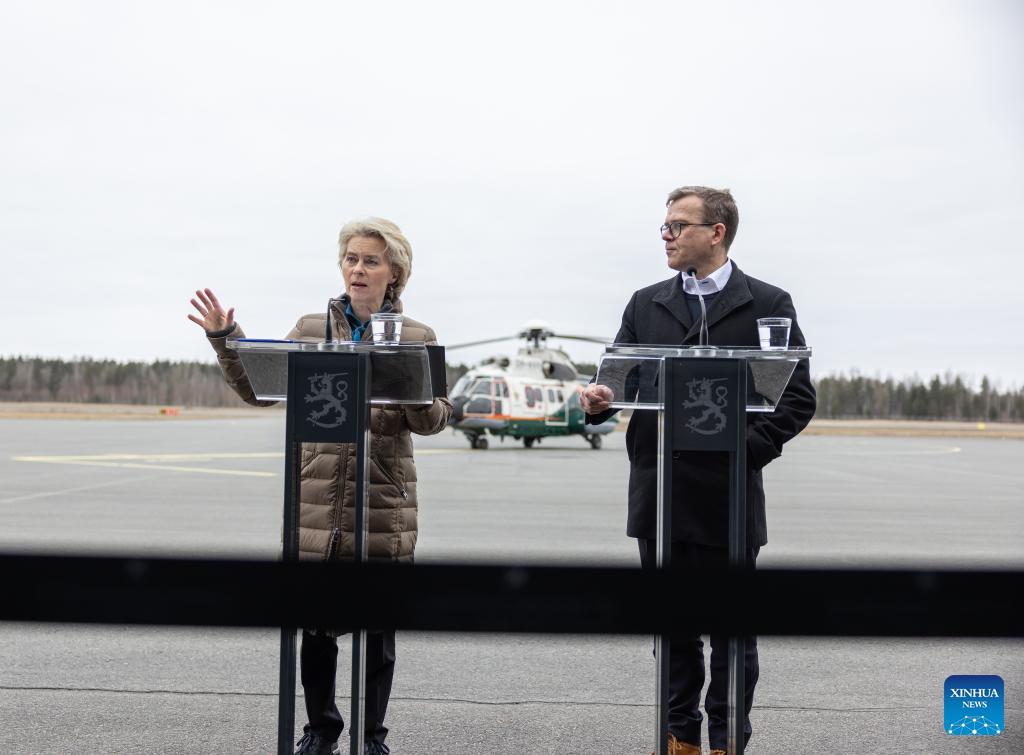
EU, Finnish leaders call for de
European Commission President Ursula von der Leyen and Finnish Prime Minister Petteri Orpo on Friday2024-04-30Toddler's mother claims his nursery asked her if her four month old baby boy was non
A mother has claimed a nursery asked her if her four-month-old baby boy was non-binary.The parent wa2024-04-30

atest comment